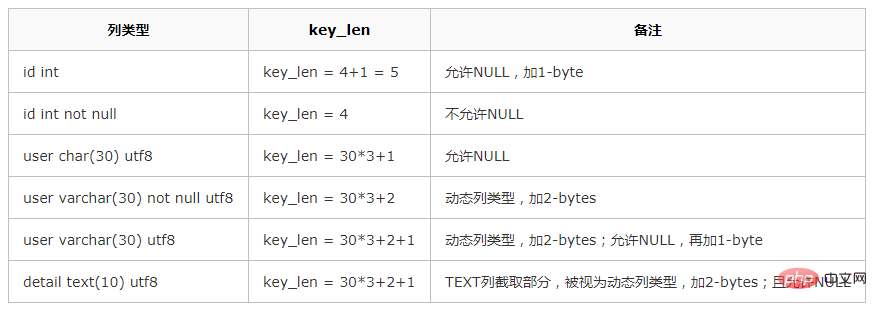
Check the key_len in the explain to determine which index is used?
There are multiple indexes in a table, and the conditions in our where field have multiple index values, so which one should we use?
Recommended: " mysql video tutorial》
We can use explain to view, the key_len field can be seen
For example, the following sql
explain select * from ent_calendar_diary where email='xxxx' and diary_id=1784; +----+-------------+--------------------+------------+-------+-------------------------+---------+---------+-------+------+----------+-------+ | id | select_type | table | partitions | type | possible_keys | key | key_len | ref | rows | filtered | Extra | +----+-------------+--------------------+------------+-------+-------------------------+---------+---------+-------+------+----------+-------+ | 1 | SIMPLE | ent_calendar_diary | NULL | const | PRIMARY,idx_email_stime | PRIMARY | 4 | const | 1 | 100.00 | NULL | +----+-------------+--------------------+------------+-------+-------------------------+---------+---------+-------+------+----------+-------+
There are two index fields in possible_keys, but key_len is 4 bytes

Remarks, key_len only indicates The index column selected for conditional filtering in WHERE does not contain ORDER BY/GROUP BY
int type and not null is 4 bytes, so the above sql uses the primary key index
explain select * from ent_calendar_diary where email='xxxx'; +----+-------------+--------------------+------------+------+-----------------+-----------------+---------+-------+------+----------+-------+ | id | select_type | table | partitions | type | possible_keys | key | key_len | ref | rows | filtered | Extra | +----+-------------+--------------------+------------+------+-----------------+-----------------+---------+-------+------+----------+-------+ | 1 | SIMPLE | ent_calendar_diary | NULL | ref | idx_email_stime | idx_email_stime | 767 | const | 111 | 100.00 | NULL | +----+-------------+--------------------+------------+------+-----------------+-----------------+---------+-------+------+----------+-------+
This is 767 bytes, varchar(255) not null 255 * 3 2 exactly matches, so it is the ordinary index of email used
CREATE TABLE `ent_calendar_diary` ( `diary_id` int(10) unsigned NOT NULL AUTO_INCREMENT, `email` varchar(255) NOT NULL, `title` varchar(100) NOT NULL, `summary` varchar(500) NOT NULL DEFAULT '', `stime` bigint(11) NOT NULL DEFAULT '0', `ctime` int(10) unsigned NOT NULL DEFAULT '0', PRIMARY KEY (`diary_id`), KEY `idx_email_stime` (`email`,`stime`) ) ENGINE=InnoDB AUTO_INCREMENT=1809 DEFAULT CHARSET=utf8
The above is the detailed content of Check key_len in the explain to determine which index is used. For more information, please follow other related articles on the PHP Chinese website!
 What are the common management systems?
What are the common management systems?
 mintui
mintui
 Which version of linux system is easy to use?
Which version of linux system is easy to use?
 What to do if an error occurs in the script of the current page
What to do if an error occurs in the script of the current page
 What are the requirements for Douyin live broadcast?
What are the requirements for Douyin live broadcast?
 Why can't I open pinterest?
Why can't I open pinterest?
 Introduction to Document in JS
Introduction to Document in JS
 What is the format of the account name of steam
What is the format of the account name of steam
 What are the enterprise erp systems?
What are the enterprise erp systems?




